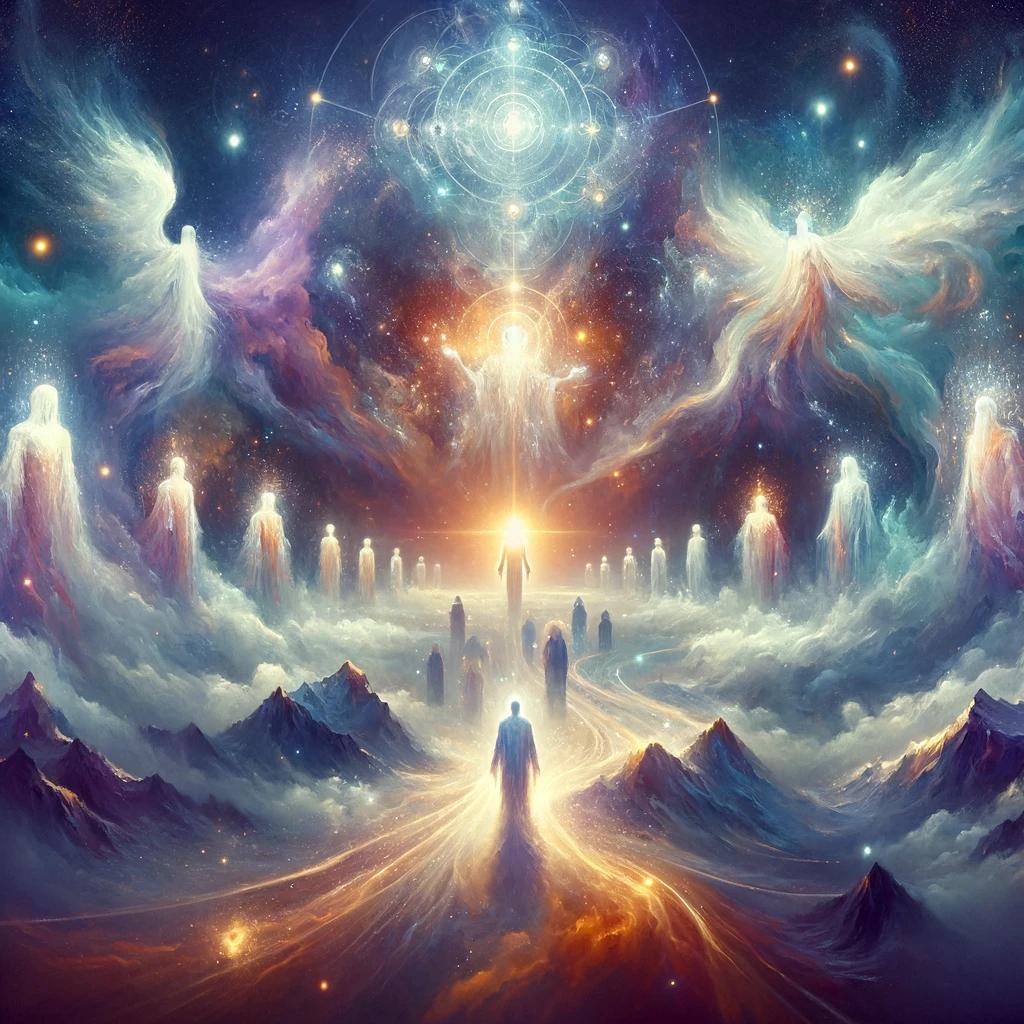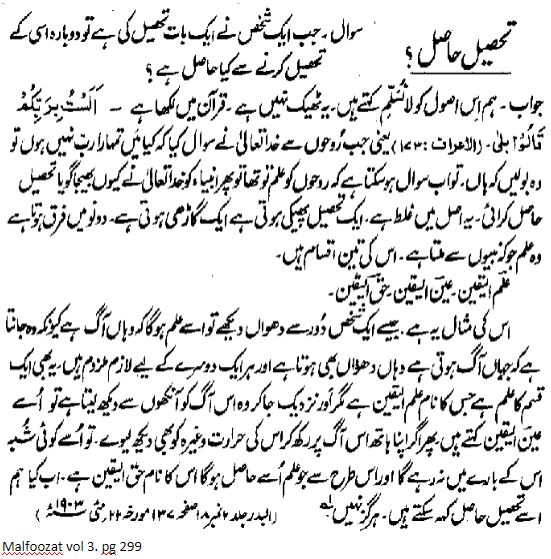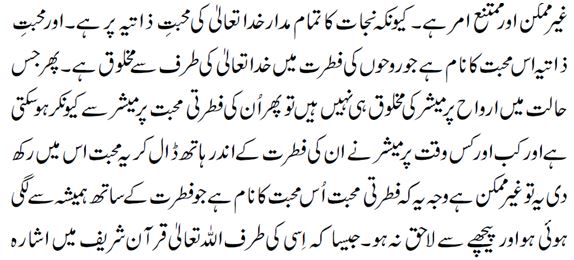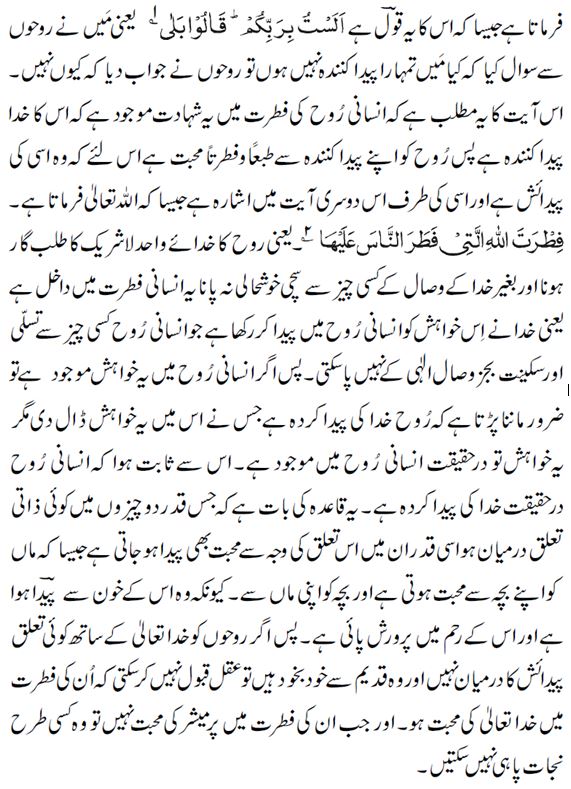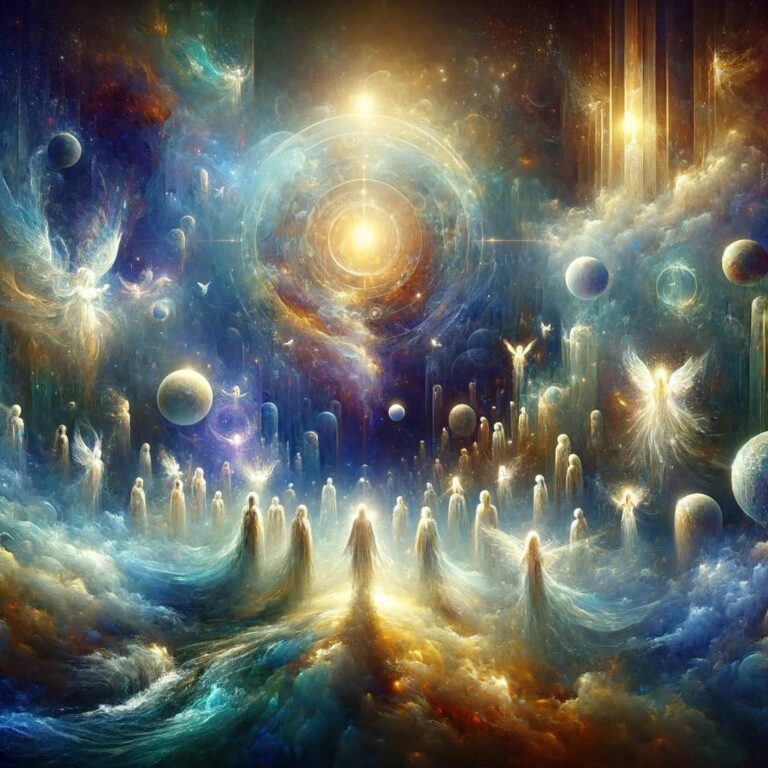
The Day of the Covenant – In the timeless time, before our time when You called us forth to bear witness.
Allah says in the Holy Qur’an:
وَإِذْ أَخَذَ رَبُّكَ مِن بَنِي آدَمَ مِن ظُهُورِهِمْ ذُرِّيَّتَهُمْ وَأَشْهَدَهُمْ عَلَىٰ أَنفُسِهِمْ أَلَسْتُ بِرَبِّكُمْ ۖ قَالُوا بَلَىٰ ۛ شَهِدْنَا ۛ أَن تَقُولُوا يَوْمَ الْقِيَامَةِ إِنَّا كُنَّا عَنْ هَـٰذَا غَافِلِينَ ﴿173﴾ أَوْ تَقُولُوا إِنَّمَا أَشْرَكَ آبَاؤُنَا مِن قَبْلُ وَكُنَّا ذُرِّيَّةً مِّن بَعْدِهِمْ ۖ أَفَتُهْلِكُنَا بِمَا فَعَلَ الْمُبْطِلُونَ ﴿174﴾ وَكَذَٰلِكَ نُفَصِّلُ الْآيَاتِ وَلَعَلَّهُمْ يَرْجِعُونَ
And when your Lord took out the offspring from the loins of the Children of Adam and made them bear witness about themselves, He said, ‘Am I not your Lord?’ and they replied, ‘Yes, we bear witness.’ So you cannot say on the Day of Resurrection, ‘We were not aware of this,’ or, ‘It was our forefathers who, before us, ascribed partners to God, and we are only the descendants who came after them: will you destroy us because of falsehoods they invented?’ In this way We explain the messages, so that they may return to Us. (7:173:175)
The fundamental understanding of this verse is that it signifies humanity’s innate recognition of God as their Lord. This “event” is referred to as the ‘ahd-i-Alast‘ or the Covenant of Alast. It occurred on the ‘ruz-e-Alast‘ or the Day of the Covenant, when human beings existed as disembodied spirits in close proximity to God.
God created these spirits and addressed them, asking, “Am I not your Lord?” They responded, “Yes, we testify [that You are our Lord and there is none worthy of worship except You].” Subsequently, these spirits entered into the sensory world.
Upon entering this world after taking the Covenant of Alast, spirits forget their original abode and their covenant with God. They become ensnared in the pitfalls of their egos. However, if they follow the guidance provided by God through the prophets—who come to remind them of the days of Allah (وَذَكِّرْهُم بِأَيَّامِ اللَّـهِ)—then they can transcend the veil of their egos. This allows their spirit to reunite with its original state of purity and unity.
Following is the dominant opinion of Scholars regarding the “Covenant of Alast”:
Allah says in a Hadith Qudsi:
I…have created My servants as Hunafa (one having a natural inclination to the worship of Allah), but it is Satan who turns them away from their belief…
Allah says in the Qur’an:
فَأَقِمْ وَجْهَكَ لِلدِّينِ حَنِيفًا ۚ فِطْرَتَ اللَّـهِ الَّتِي فَطَرَ النَّاسَ عَلَيْهَا ۚ لَا تَبْدِيلَ لِخَلْقِ اللَّـهِ
So [Prophet], stand firm and true in your devotion to the religion. This is the natural disposition God instilled in mankind – there is no altering God’s creation. (30:31)
The Messenger of Allah said:
كُلُّ مَوْلُودٍ يُولَدُ عَلَى الْفِطْرَةِ، فَأَبَوَاهُ يُهَوِّدَانِهِ أَوْ يُنَصِّرَانِهِ أَوْ يُمَجِّسَانِهِ، كَمَثَلِ الْبَهِيمَةِ تُنْتَجُ الْبَهِيمَةَ، هَلْ تَرَى فِيهَا جَدْعَاءَ
The Prophet (ﷺ) said, “Every child is born upon fitrah (the primordial nature/natural disposition/inclination/sound human nature (that Allah instilled in mankind – i.e. to worship none but Allah Alone)) then his parents make him into a Jew, or a Christian or a Zoroastrian, as an animal delivers a perfect baby animal. Do you find it mutilated?”
The aforementioned verses and Ahadith indicate that everyone is born with a natural inclination towards monotheism as the ultimate truth. All people inherently incline towards recognizing their Creator, Master, and Sustainer. However, due to the influence of false beliefs and unfavorable external circumstances, they can deviate from their innate nature.
Sometimes, to help readers grasp a state or condition of spirits that might otherwise be challenging to understand, concepts are presented in the form of a dialogue or a story. The Promised Messiah (a.s) remarked that this verse is presented in the form of a dialogue. Spirits are created and have not existed eternally.
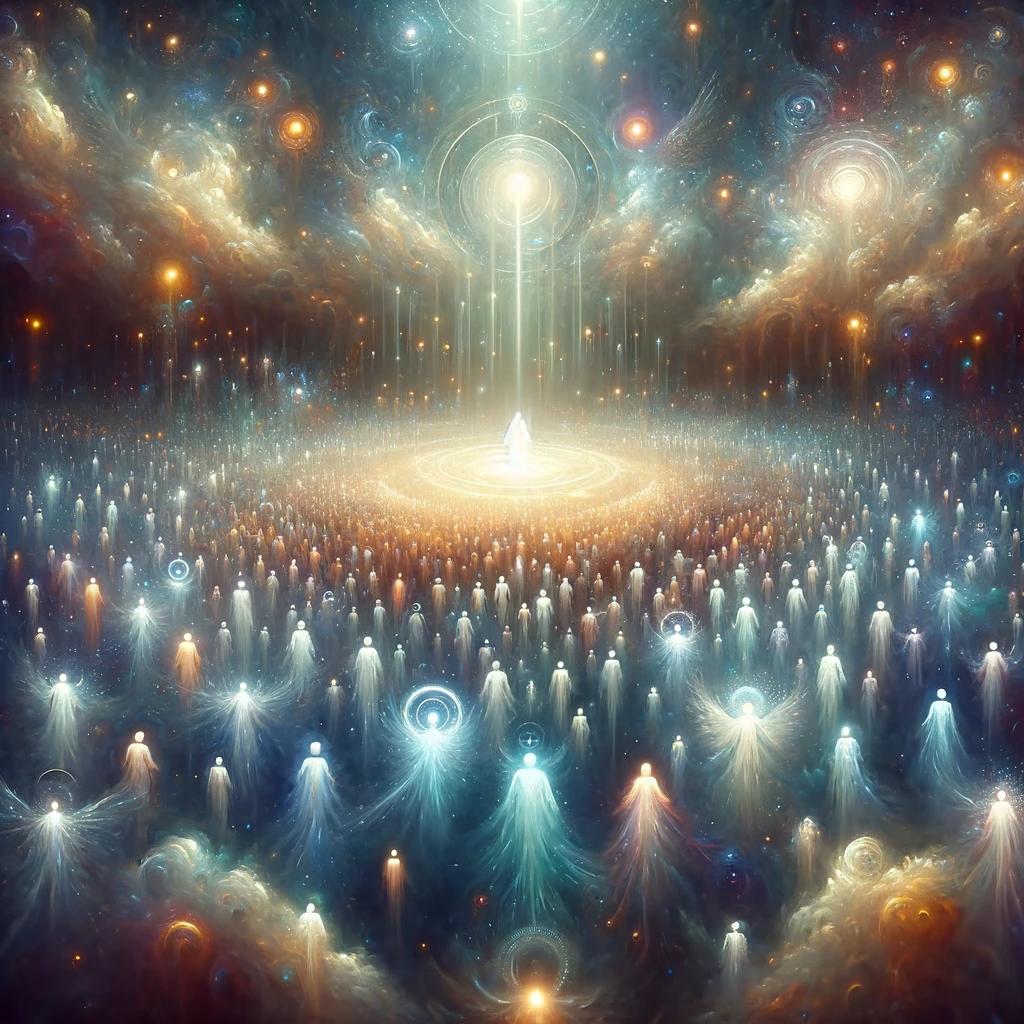
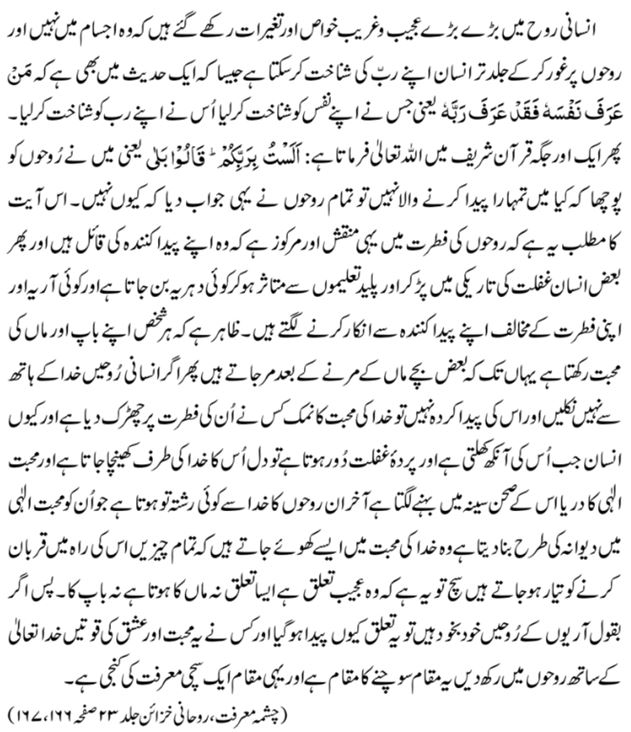
Translation in present tense:
And when thy Lord brings forth from Adam’s children – out of their loins – their offspring and makes them witnesses against their ownselves by saying: ‘Am I not your Lord?’ They say, ‘Yea, we do bear witness.’ This He does lest you should say on the Day of Resurrection, ‘We were surely unaware of this.’
Or lest you should say, ‘It was only our fathers who attributed co-partners to God in the past and we were merely a generation after them. Wilt Thou then destroy us for what was done by those who lied?’
And thus do We make clear the Signs, that they may be admonished and that they may return to Us.
The verse may be interpreted in two ways. It may either be taken to refer to the inborn idea in man about the existence of a Supreme Being Who has created and Who governs the Universe. God has embedded this idea in the very nature of man so that he may be admonished thereby and seek a way towards his Maker. The expression, out of their loins, supports this interpretation. It should not, however, be supposed that the dialogue actually took place. The words are simply meant to express a state of affairs.
The second interpretation relates to the appearance of Prophets whom God sends to show people His way. In this case it is worthy of note that when speaking about “making them witnesses against their own-selves” the verse does not mention Adam but the children of Adam, which points to the fact that the expression, “offspring from the children of Adam”, means the people of every new age or era to whom a Messenger of God is sent. It is, in fact, the advent of every new Messenger that prompts the divine query, Am I not your Lord? The query asserts that when God has made a provision for the physical sustenance of mankind as well as for their moral and spiritual development, they cannot deny His lordship. To this question the only possible reply can be, Yea, we do bear witness. It is indeed only through the rejection of their Prophet that the people of an age become witnesses against themselves; for in that case they cannot take shelter behind the excuse that they did not know God or His Law or the Day of Judgement.
The appearance of a Prophet also debars the people of his time from urging the plea mentioned in the present verse, for then the truth is made manifest from falsehood and idolatry stands publicly condemned.
English w/5 Vol. Commentary
Original faith (al-iman al-asli) is the primordial nature in accordance with which God created mankind. It is their witnessing to His Oneness (wahdaniyya) at the taking of the Covenant. Hence every child is born in keeping with that Covenant. However, when he falls by means of the body into the confines of Nature—the place of forgetfulness—he becomes ignorant and forgets the state which he had had with his Lord. Hence, when he reaches the state which allows rational consideration, he needs to consider proofs concerning the oneness of his Creator. If he does not reach this state, his property is the same as that of his parents. If they had faith, he will take the declaration of God’s Unity from them, as a following of authority. Whatever their religion might be, he joins with them.
He whose faith is a resolute following of authority is more protected and firm in his faith than he who takes it from proofs, because of the bewilderment, unsoundness, and obfuscations to which proofs are susceptible if he should be clever, astute, and strong in understanding. Hence he has no firm foot nor any leg upon which to stand. One must fear for him.
If the faith in the declaration of God’s Unity which he gains should be preceded by an associating of others with Him (shirk) which he inherits from his parents, from his rational consideration, or from the community of which he is a member, then his [new-found] faith will be identical with his Covenant faith, nothing else.
The veil of associating comes between the servant and the Covenant faith like a cloud which comes between the eye and the sun. When the cloud passes by, the sun appears to the eye. Such is the appearance of faith to the servant when associating others with God is eliminated, if the one who associates admits the existence of God. (II 616.19)
Think, impress upon your mind and understand what I say. Allah Most High first created, from the divine light of His own Beauty, the light of Muhammad. He declares this in a divine tradition related from Him by the Prophet.
I have created the soul of Muhammad from the light of my Manifestation (wajh).
This is declared by our Master the Messenger of Allah in his words, ‘Allah first created my soul. He first created it as a divine light;’ ‘Allah created the Pen first;’ ‘Allah first created the Intellect.’ What is meant by all that is mentioned as having been created first is the creation of the truth of Muhammad, the hidden reality of Muhammad. He is also [like his Lord] called by many beautiful names. He is called Nur, the Divine Light, because he was purified of the darkness hidden under the attribute of the might and wrath (jalal) of Allah. Allah Most High says in His Holy Qur’an:
There has come to you from Allah a light and a perspicuous Book. (Sura Ma’idah, 15)
He is called the Total Intellect (‘aql al-kull) because he saw and understood everything. He is called the Pen (al-qalam) because he spread wisdom and knowledge, and he poured knowledge into the realm of letters.
The soul of Muhammad is the essence of all beings, the beginning and the reality of the universe. He indicates this with the words, ‘I am from Allah and the believers are from me’. Allah Most High created all souls from his soul in the realm of the first created beings, in the best of forms. ‘Muhammad’ is the name of all humanity in the realm of souls (‘alam al-arwah) . He is the source, the home of each and every thing.
Four thousand years after the creation of the light of Muhammad, Allah created the Heavenly Throne (‘arsh) from the light of the eye of Muhammad. He created the rest of creation from the Heavenly Throne. Then He sent the souls to descend to the lowest levels of creation, to the realm of this material world, to the realm of matter and bodies. Then We make him descend to the lowest of the low. (Sura Tin, 5). He sent that light from where it was created, from the Ultimate Realm (‘alam al-lahut) — which is the realm of the manifestation of Allah’s Essence, of unity, of absolute being — to the realm of the divine Names, the manifestation of the divine attributes, the realm of the causal intelligence of the Total Soul. There He dressed the souls in robes of light. These souls are called ‘sultan-souls’. Clothed in light they descended to the realm of the angels. There He clothed them with the brilliant robes of angels, there they were called ‘spiritual souls’. Then He caused them to descend to the world of matter, of water and fire, earth and ether, and they became human souls. Then from this world He created the bodies of flesh.
From it We created you and itito it We shall return you, and from it raise you a second time. (Sura Ta Ha, 55)
After these stages, Allah ordered the souls to enter into their bodies, and by His will they entered.
So when I have made him complete and breathed into him of My Soul. . . (Sura Sad, 72)
A time came when these souls started binding themselves to the flesh and forgot their source and their covenant. They forgot that when Allah created them in the realm of souls He had asked them, “Am I not your Lord?” and they had answered, “Indeed!” They forgot their promise, they forgot their source, their way to return home; but Allah is merciful, the source of all help and security for His creation. He had mercy upon them, so He sent divine books and messengers to them to remind them of their origin.
And certainly We sent Moses with Our messages [saying]: Bring forth the people from darkness into light, and remind them of the days of Allah. . . (Sura Ibrahim, 5)
That is, ‘Remind the souls of the days when they were in union with Allah.’
Many messengers have come to this world, fulfilled their duties, and passed away. The purpose of all was to bring men the message and awaken people to heedfulness. But people who remembered Him, who turned toward Him, people who wished to return to their divine origin, people who arrived at their origin, became fewer and fewer with time.
The prophets kept coming and the divine message continued until there appeared the great spirit of Muhammad, the seal of the messengers who saved people from distraction. Allah Most High sent him to open the eyes of the hearts of the heedless. His purpose was to awaken them from the sleep of unconsciousness and to unite them with the Eternal Beauty, with the Cause, with the Essence of Allah.
Allah says in His Holy Qur’an:
Say: This is my way. I call to Allah with the certainty of insight — I and those who follow me. . . (Sura Yusuf, 108)
to indicate the path of our Master the Prophet.
Ruzbihan writes, ‘The Real unveiled His beauty (jamal) to the spirits of the passionate lovers in His first appearance after introducing Himself to them by saying, ‘Am I not your Lord?’; and “He unveiled to [the spirits] the beauty (jamal) of [His] majesty, and spoke to them in a specific address.” He also says, “He made [the spirits] all become passionate lovers of [God’s] beauty and majesty between the light of [His] attributes and the light of [His] essence.”
Ruzbihan also writes, “The spirits were immersed in the oceans of the eternal beauty (jamal) and became enraptured through the quality of passionate love in the deserts of recognition.”
As for the specific love, it belongs to the elect after witnessing [God]. The folk of witnessing have three occasions of witnessing. One occurs to the spirits before the bodies, before human existence, in the presence of the [divine] glory. When He brought them together, He said to the chieftains of the spirits: “Am I not your Lord?” They said “Yea” (Q 7:172) voluntarily. The pleasure of the speech reached them. They asked for beauty (jamal) from the Real so that recognition would become complete. The Real took off the veil of invincibility and presented to them the beauty (jamal) of the majesty of the essence. The spirits of the prophets and saints became drunk from the effect of the listening and the beauty of the majesty. They fell in love with the eternal Witness (Shahid) without any trace of temporal origination. From that friendship (walayat), their love (mahabbat) increased in accordance with the degree of divine nurturing, because when the holy spirits appeared in the earthly form. all became savers of “Show me” because of the ancient love-madness.”
The last sentence refers to Abraham and Moses, both of whom said “Show me” (arini) to God on different occasions (Q 2:260 and 7:143, respectively)
What is this testimony? To make the hidden manifest, whether through words, deeds, or something else.
For the goal is to make manifest the hidden secret of your substance: Its attribute will remain, but these accidents will pass… .
This prayer, spiritual warfare, and fasting do not remain: The spirit remains with a good name. (11/44 V 248-247, 49)
We are in this courtroom world, presided over by the Judge who issues decrees, for the sake of the litigation between Am I not? and Yea.
For we said Yea, and in our trial our actions and words are testimony and evidence.
Why do we keep silence in the court of the Judge? Did we not come in the first place to give witness? .. .
Whether in a hundred years, or in a moment. Discharge this Trust and be delivered. (M V 174-178. 82)
On the Day of Alast the Beloved said something else, but in a whisper. Do any of you remember?
He said, “I have hurried to you. I have made you for Myself. I will not sell what I have made for Myself at auction.“
I said. “Who an Thou?” He said, “The Desire of all.” I said. “Who am I?” He said. “The desire of the Desire.” (D 9265-67)
Which will overcome. Mercy or Wrath? Which will overcome, the springs of Paradise or the fires of Hell?
Since the Covenant of Alast, both branches—forbearance and anger—have existed to attract men to themselves.
That is why both negation and affirmation are contained in the single word “Alast” (“Am I not?“).
For this word is affirmative through its interrogative form, but “not” is buried within it. (M V 2123-26)
Hence Rumi calls the body “the shadow of the shadow of the shadow of the heart” (M VI 3307).
The spirit of God’s lover exists In No-place. while this body of his is the shadow of Alast. The spirit-sun is dancing. and this body is stamping its feet. (D 25013)
The body did not exist and I was a spirit with Thee in heaven; between us was none of my speaking and listening. (D 19132)
Without composition and one in substance, we were all on yonder side, headless and footless.
Like the sun we were one substance, like water we were pure and without ripples.
When that pure light entered into form, multiplicity appeared like the shadow of a battlement. (M I 686-688)
In that Am I not and Yen, you were a spirit without body. At that time you saw you were that. Why are you worried now about this? (ID 32620)
Before you were this body. you were a pure spirit. How long will you keep yourself separate from that?
You are a pure spirit in the midst of black earth. I will say nothing—do you consider it proper?
You cannot discern yourself from your cloak—for you have put on a cloak of water and clay. (D 33704-06)
Before this the spirits were upon the spheres, drinking from the same cup as the angels. My spirit is clapping its hands, since Thou an pulling It back to the same place. (D 35818)
The birds of consciousness have descended from the heavens and become tied to the earth for two or three days.
They were sent from the spheres—though they are the stars in religion’s heaven—
To realize the worth of union with God and to see the pain of separation from Him. (D 7192-94)
This world came first of necessity, so that you can realize the worth of the realm of Mast. (M V 600)
Like fish we say to the Ocean of Life, “Why didst Thou send up waves and throw us onto the dryness of water and clay? Thou possessest such mercy, why didst Thou give us such torment? Oh, Thy mercilessness is sweeter than the mercy of all the merciful creatures of the world!”
The Ocean replies, “I was a Hidden Treasure, so I wanted to be known“: “I was a treasure, concealed behind the curtain of the Unseen, hidden in the retreat of No-place. I wanted My Beauty and Majesty to be known through the veils of existence. I wanted everyone to see what sort of Water of Life and Alchemy of Happiness I am.“
The fish answer, “We who are fish in this sea, from the first we swam in this Ocean of Life. We knew its Tremendousness and Gentleness, for we are the copper that receives the elixir of this ultimate Alchemy. We knew the mightiness of this elixir of Life. As much as we spoke of it to those who are not fish of this sea, they did not listen, see, or understand. From the first we were the knowers of this Treasure, and at the last we will know it. So at whom didst Thou direct such a long exile for the sake of ‘I wanted to be known.“
The answer comes, “Oh fish! True enough, a fish knows the water’s worth, loves the sea, and clings to union with it. But his love is not of the same kind, so hot and burning, with such self-abandonment, with such lamentation and weeping of blood, end with such roasting of the liver, as the love of that fish who has been thrown upon dry land by the waves and for a long time struggles and tosses upon the hot earth and burning sand. He shall neither die therein, nor live (LXXXVII 13). Separation from the Ocean allows him no taste of life’s sweetness—after all, that is separation from the Ocean of Life. How should someone who has seen that Ocean find joy in this life?” (MS 29)
The sunlight of the spirits became divided within the windows, the bodies.
When you look at the sun’s disc, indeed It is one. But he who is veiled by the bodies is in doubt. (M II 186-187)
The spirits of wolves and dogs are separate, everyone, but the spirits of God’s lions are united.
I refer to their spirits by a plural noun because that one spirit is a hundred in relation to bodies.
In the same way the light of heaven’s sun is a hundred in relation to the courtyards of houses.
But all their lights are one when you remove the walls from between.
When the bodily houses have lost their foundations the believers become like a “single soul.” (M IV 414-418).
In this last passage Rumi is commenting upon a saying of the Prophet: “The believers are brothers, and the men of knowledge are like a single soul.” But his remarks on the original unity of the human spirit before its manifestation in the world can just as well be taken as a commentary on any one of a number of Koranic verses to which he sometimes refers. For example,
In the eye of realized discernment we are all a single soul: Your creation and your upraising are as but a single soul (XXXI 28). The more a part is wounded, the more aware it is of this unity, so it takes on the color of peace, not war.20 (MK 8: 15/52)
——
At every instant and from every side,
resounds the call of Love:
We are going to sky,
who wants to come with us?
We have gone to heaven,
we have been the friends of the angels,
And now we will go back there,
for there is our country.
We are higher than heaven,
more noble than the angels:
Why not go beyond them?
Our goal is the Supreme Majesty.
What has the fine pearl to do with the world of dust?
Why have you come down here?
Take your baggage back.
What is this place?
Luck is with us, to us is the sacrifice!
Like the birds of the sea,
men come from the ocean – the ocean of the soul.
How could this bird, born from that sea,
make his dwelling here?
No, we are the pearls from the bosom of the sea,
it is there that we dwell:
Otherwise,
how could the wave succeed
to the wave that comes from the soul?
The wave named, ‘Am I not your Lord‘ has come,
it has broken the vessel of the body;
And when the vessel is broken,
the vision comes back, and the union with Love.
——
By the God who was in pre-eternity living and moving and omnipotent, everlasting.
His light lit the candles of love so that a hundred thousand secrets became known.
By one decree of Him the world was filled — lover and loved, ruler and ruled.
In the talismans of Shams-e Tabrizi the treasure of His marvels became concealed.
For from the moment that you journeyed forth, we became separated from sweetness like wax;
All the night we are burning like candles, paired to his flame and deprived of honey.
In separation from his beauty, my body is a waste, and the soul in it is like an owl.
Turn those reins in this direction, twist the trunk of the elephant of joy.
Without your presence concert is not lawful; music has been stoned like Satan.
Without you not one ode has been uttered, until that gracious vision of yours arrived and was understood;
Then out of the joy of hearing your letter five or six odes were composed.
May our eventide through you be radiant dawn, O you in whom Syria and Armenia and Rum glory.
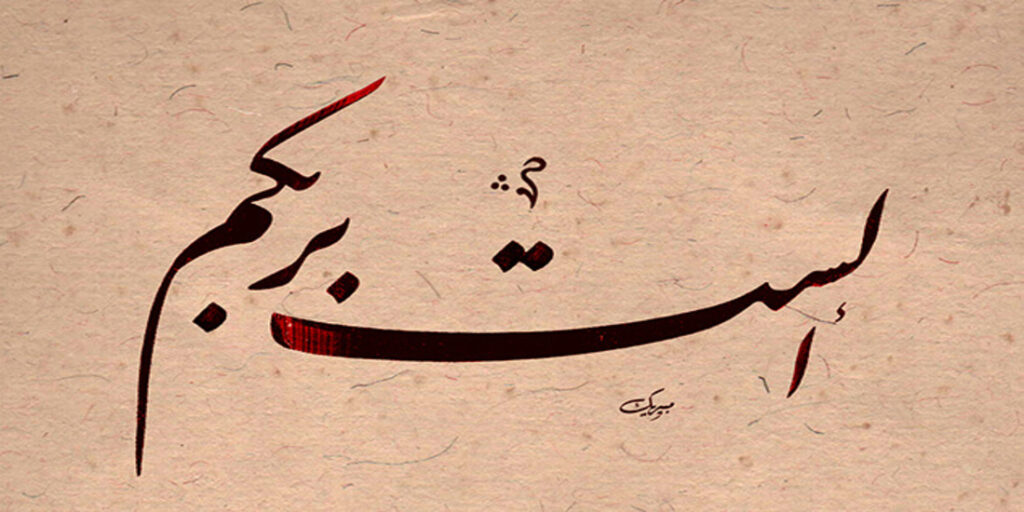
Human beings innately acknowledge that they have a creator and have a desire to turn to a Supreme Being with love and devotion.
The Promised Messiaha.s writes:
“Of the natural conditions of man is his search after an Exalted Being towards Whom he has an inherent attraction. This is manifested by an infant from the moment of its birth. As soon as it is born, it displays a spiritual characteristic that it inclines towards its mother and is inspired by love of her. As its faculties are developed and its nature begins to display itself openly, this inherent quality is displayed more and more strongly. It finds no comfort anywhere except in the lap of its mother. If it is separated from her and finds itself at a distance from her, its life becomes bitter. Heaps of bounties fail to beguile it away from its mother in whom all its joy is concentrated. It feels no joy apart from her. What, then, is the nature of the attraction which an infant feels so strongly towards its mother? It is the attraction which the True Creator has implanted in the nature of man.
The same attraction comes into play whenever a person feels love for another. It is a reflection of the attraction that is inherent in man’s nature towards God, as if he is in search of something that he misses, the name of which he has forgotten and which he seeks to find in one thing or another which he takes up from time to time. A person’s love of wealth or offspring or wife or his soul being attracted towards a musical voice are all indications of his search for the True Beloved. As man cannot behold with his physical eyes the Imperceptible Being, Who is latent like the quality of fire in everyone, but is hidden, nor can he discover Him through the mere exercise of imperfect reason, he has been misled grievously in his search and has mistakenly assigned His position to others. The Holy Quran has, in this context, set forth an excellent illustration, to the effect that the world is like a palace, the floor of which is paved with smooth slabs of glass, under which flows a rapid current of water. Every eye that beholds this floor mistakenly imagines it to be running water. A person fears to tread upon the floor as he would be afraid of treading upon running water, though in reality the floor is only paved with smooth transparent slabs of glass. Thus these heavenly bodies like the sun and the moon etc. are the smooth and transparent slabs of glass under which a great power is in operation like a fast flowing current of water. It is a great mistake on the part of those who worship these heavenly bodies that they attribute to them that which is manifested by the power that operates behind them. This is the interpretation of the verse of the Holy Quran:
It is a palace paved with smooth slabs of glass
Holy Qur’an 27:45
The Philosophy of the Teachings of Islam
